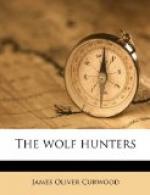As the Indian youth sped over the trail in the direction of the rifle-shots he flung his usual caution to the winds. His blood thrilled with the knowledge that there was not a moment to lose—that even now, in all probability, he would be too late to assist his friends. This fear was emphasized by the absolute silence which followed the five shots. Eagerly, almost prayerfully, he listened as he ran for other sounds of battle—for the report of Mukoki’s revolver, or the whoops of the victors. If there had been an ambush it was all over now. Each moment added to his conviction, and as he thrust the muzzle of his gun ahead of him, his finger hovering near the trigger and his snow-blinded eyes staring ahead into the storm, something like a sob escaped his lips.
Ahead of him the stream narrowed until it almost buried itself under a mass of towering cedars. The closeness of the forest walls now added to the general gloom, intensified by the first gray pallor of the Northern dusk, which begins to fall in these regions early in the afternoon of November days. For a moment, just before plunging into the gloomy trail between the cedars, Wabi stopped and listened. He heard nothing but the beating of his own heart, which worked like a trip-hammer within his breast. The stillness was oppressive. And the longer he listened the more some invisible power seemed to hold him back. It was not fear, it was not lack of courage, but—
What was there just beyond those cedars, lurking cautiously in the snow gloom?
With instinct that was almost animal in its unreasonableness Wabi sank upon his knees. He had seen nothing, he had heard nothing; but he crouched close, until he was no larger than a waiting wolf, and there was a deadly earnestness in the manner in which he turned his rifle into the deeper gloom of those close-knit walls of forest. Something was approaching, cautiously, stealthily, and with extreme slowness. The Indian boy felt that this was so, and yet if his life had depended upon it he could not have told why. He huddled himself lower in the snow. His eyes gleamed with excitement. Minute after minute passed, and still there came no sound. Then, from far up that dusky avenue of cedars, there came the sudden startled chatter of a moose-bird. It was a warning which years of experience had taught Wabi always to respect. Perhaps a roving fox had frightened it, perhaps the bird had taken to noisy flight at the near tread of a moose, a caribou, or a deer. But—
To Wabi the soft, quick notes of the moose-bird spelled man! In an instant he was upon his feet, darting quickly into the sheltering cedars of the shore. Through these he now made his way with extreme caution, keeping close to the bank of the frozen stream. After a little he paused again and concealed himself behind the end of a fallen log. Ahead of him he could look into the snow gloom between the cedars, and whatever was coming through that gloom would have to pass within a dozen yards of him. Each moment added to his excitement. He heard the chatter of a red squirrel, much nearer than the moose-bird. Once he fancied that he heard the striking of two objects, as though a rifle barrel had accidentally come into contact with the dead limb of a tree.




